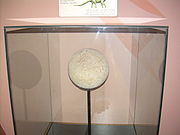
Allen Formation
Encyclopedia
The Allen Formation is a geological formation in Argentina
whose strata date back to the Late Cretaceous
(middle Campanian to early Maastrichtian . Dinosaur remains are among the fossils that have been recovered from the formation.
Argentina
Argentina , officially the Argentine Republic , is the second largest country in South America by land area, after Brazil. It is constituted as a federation of 23 provinces and an autonomous city, Buenos Aires...
whose strata date back to the Late Cretaceous
Late Cretaceous
The Late Cretaceous is the younger of two epochs into which the Cretaceous period is divided in the geologic timescale. Rock strata from this epoch form the Upper Cretaceous series...
(middle Campanian to early Maastrichtian . Dinosaur remains are among the fossils that have been recovered from the formation.
Dinosaurs
Dinosaur eggs are known from the formation.| Dinosaur Dinosaur Dinosaurs are a diverse group of animals of the clade and superorder Dinosauria. They were the dominant terrestrial vertebrates for over 160 million years, from the late Triassic period until the end of the Cretaceous , when the Cretaceous–Paleogene extinction event led to the extinction of... s reported from the Allen Formation |
||||||
|---|---|---|---|---|---|---|
| Genus | Species | Location | Stratigraphic position | Material | Notes | Images |
Aeolosaurus Aeolosaurus Aeolosaurus is a genus of titanosaurian sauropod dinosaur from the Late Cretaceous Period of what is now South America. Like most sauropods, it would have been a quadrupedal herbivore with a long neck and tail... |
Indeterminate |
|||||
Austroraptor Austroraptor Austroraptor was a genus of dromaeosaurid dinosaur that lived about 70 million years ago during the Cretaceous period in what is now modern Argentina. The type species for the genus, Austroraptor cabazai, was described in late 2008 by Fernando Novas of the Museo Argentino de Ciencias Naturales... |
A. cabazai |
 |
||||
Laplatasaurus Laplatasaurus Laplatasaurus is a genus of titanosaurid sauropod dinosaur that lived during the Late Cretaceous in South America.... |
L. araukanicus |
|||||
Limenavis Limenavis Limenavis is a prehistoric bird genus from the Late Cretaceous. It lived about 70 million years ago, around the Campanian-Maastrichtian boundary... |
L. patagonica |
"Partial forelimb." |
||||
Pellegrinisaurus Pellegrinisaurus Pellegrinisaurus is the name given to a genus of dinosaur from the Late Cretaceous. It was a titanosaur which lived in what is now Argentina. The type species, Pellegrinisaurus powelli, was described by Salgado in 1996, and is based on mostly vertebrae... |
P. powelli |
"Dorsal and caudal vertebrae, partial femur." |
||||
Quilmesaurus Quilmesaurus Quilmesaurus is a genus of theropod dinosaur from the Patagonian Upper Cretaceous , a time when South American theropod assemblages were dominated by abelisaurids and carcharodontosaurs. However, the morphology of Quilmesaurus suggests it may have been a tetanuran... |
Q. curriei |
Femur and distal tibia. |
||||
Rocasaurus Rocasaurus Rocasaurus is a genus of titanosaurian sauropod that lived in South America about 80 million years ago, during the Late Cretaceous. This genus grew up to 8 meters long, making it one of the smaller sauropods... |
R. muniozi |
"Partial postcranial skeleton." |
||||
Saltasaurus Saltasaurus Saltasaurus is a genus of titanosaurid sauropod dinosaur of the Late Cretaceous Period. Relatively small among sauropods, though still massive by the standards of modern creatures, Saltasaurus was characterized by a diplodocid-like head... |
S. robustus |
|||||
Willinakaqe Willinakaqe Willinakaqe is an extinct genus of saurolophine hadrosaurid dinosaur which lived during the late Cretaceous of the Río Negro Province of southern Argentina.... |
W. salitralensis |
|||||
Mammals
The mammal fauna of the Allen Formation is known from seven teeth, which document the presence of several species.| Mammal Mammal Mammals are members of a class of air-breathing vertebrate animals characterised by the possession of endothermy, hair, three middle ear bones, and mammary glands functional in mothers with young... s reported from the Allen Formation |
||||||
|---|---|---|---|---|---|---|
| Genus | Species | Location | Stratigraphic position | Material | Notes | Images |
| Mesungulatum | M. lamarquensis | Cerro Tortuga | Two upper molars and a fragmentary lower molar | A dryolestoid | ||
| Groebertherium | G. stipanicici | Cerro Tortuga | One upper molar | A dryolestoid | ||
| Cf. Brandonia | sp. | Cerro Tortuga | One lower molar | A dryolestoid | ||
| Barberenia | B. allenensis | Cerro Tortuga | One upper molariform | A dryolestoid | ||
| Trapalcotherium Trapalcotherium Trapalcotherium is a fossil mammal from the Cretaceous of Argentina in the family Ferugliotheriidae. The single species, T. matuastensis, is known from one tooth, a first lower molar. It is from the Allen Formation, which is probably Maastrichtian in age, and was first described in 2009... |
T. matuastensis | Cerro Tortuga | One first lower molar | A gondwanathere | ||

